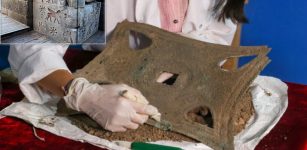Ancient Objects Used In Unknown Celtic Ritual Discovered In Polish Lake
Conny Waters - AncientPages.com - Archaeologists have made a significant discovery in a lake in northern Poland, uncovering evidence of an ancient ritual site. The initial finding of a sword over 2,000 years old prompted a thorough investigation of the lake, which has yielded results that could provide valuable insights into the enigmatic history of the Celtic people.
The underwater research on one of the Kujawy lakes was conducted by a team from the University of Warsaw, revealed a ritual Celtic site in one of the Kujawy lakes. Professor Bartosz Kontny, who leads the Underwater Archaeology Laboratory at the university's Faculty of Archaeology, emphasizes the considerable importance of this discovery.
Fragment of the chain belt. Photo by Miron Bogacki
Celts are an Indo-European people who inhabited the lands of present-day Poland. Until recently, historians believed their settlements stretched from England to the Carpathian Basin, from southern France, the Iberian Peninsula, and northern Italy to Silesia, Lesser Poland, and the San River basin. A decade ago, researchers proved that Celts also lived in Kujawy in the 1st century B.C.
This finding is expected to contribute substantially to our understanding of Celtic culture and practices in the region. The underwater location of the site has likely helped preserve artifacts and evidence that might not have survived in other environments, potentially offering a unique window into Celtic rituals and daily life from over two millennia ago.
Research by archaeologists from the University of Warsaw in a lake in Kujawy. Photo by Bartosz Kontny
"Firstly, this confirms larger sacrificial deposits in Polish waters (and the first from a lake) by the Celts. Previously, only single Celtic swords from rivers were known, mainly associated with the Przeworsk culture. In the broader Celtic areas, this phenomenon is known, but there are only a few confirmed sites of this type.
Fragment of a sword sheath found in the lake. Photo by Miron Bogacki
Secondly, Celts were not expected in this part of Poland during the 3rd century B.C, which is when the excavated objects should be dated. This discovery forces us to revise this region's prehistory and sheds new light on the process of cultural changes, ultimately leading to the development of a new cultural model (strongly inspired by the Celts) in the 2nd century B.C," the archaeologist reported to PAP. Among the artifacts found are sickles, as well as fragments of iron sword scabbards and chain belts on which the Celts hung their bladed weapons.
"The Celts were famous for offering weapons and tools from blacksmiths, carpenters, and kitchens to deities in waters (rivers, lakes, swamps), rock crevices, or hard-to-reach places in the mountains. Our discovery is part of such a set of offerings," the archaeologist emphasized.
See also: More Archaeology News
The choice of the research site was based on a significant archaeological discovery. A Celtic sword dating back to the 3rd century B.C. was found and is currently housed in the Land Forces Museum in Bydgoszcz. The researchers were able to contact the individual who made the discovery, who provided information about the exact location where the sword was found.
Researchers are withholding the exact location of the discovery to protect the site's integrity and prevent unauthorized disturbances. Further investigations are planned, and the location will be revealed after the research concludes, expected this autumn.
Written by Conny Waters – AncientPages.com Staff Writer
























